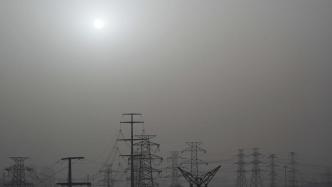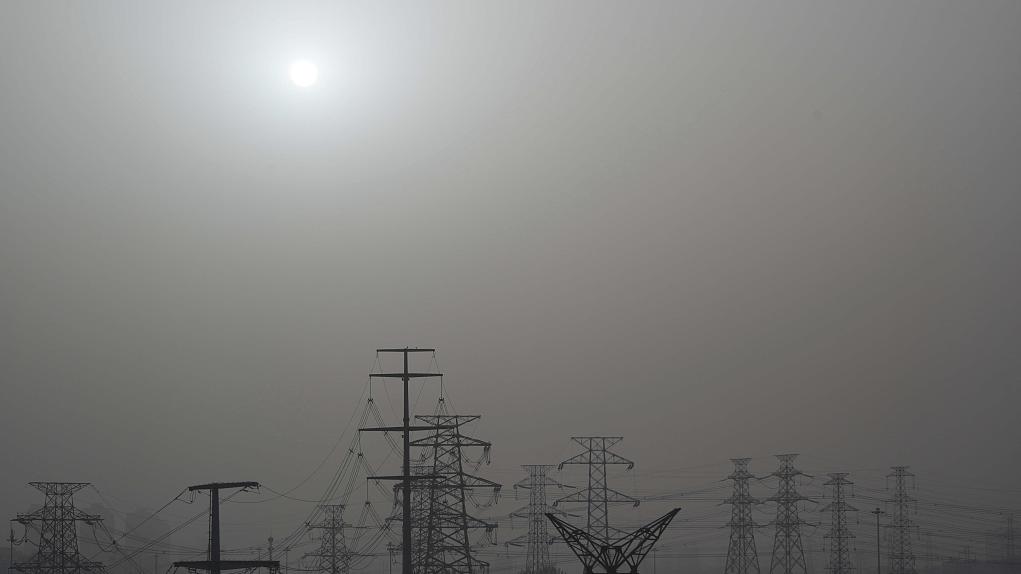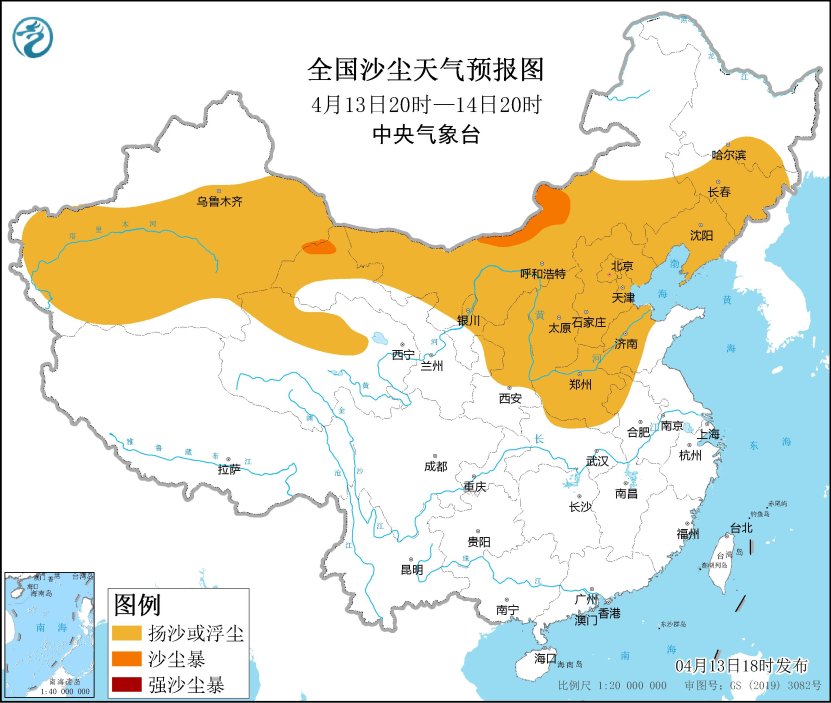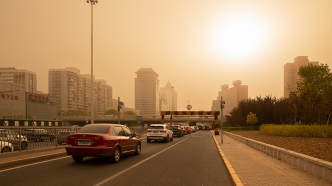

On April 13, 2023, Beijing, yellow sand covered the city. Visual China Map
Recently, sandstorms have "come back", and a short article published two years ago by Feng Yujun, a professor at Fudan University, has once again attracted people's attention.
Feng Yujun is currently the deputy dean of the Institute of International Studies, Fudan University, director of the Center for Russian and Central Asian Studies, and director of the Shanghai Cooperation Organization Research Center. He mainly studies international energy security and diplomacy, China's peripheral security, and Russian international relations theory.
Two years ago, in the spring of 2021, many places in northern my country were affected by sandstorms originating in Mongolia. In response to this problem, in May 2021, Feng Yujun published an article in the journal "World Knowledge", titled "Ecological security should become an important consideration for the global layout of China's resource imports".
On April 11, 2023, Phoenix.com republished the aforementioned article.

Feng Yujun is a professor at Fudan University, deputy dean of the Institute of International Studies of Fudan University, director of the Center for Russian and Central Asian Studies, and director of the Shanghai Cooperation Organization Research Center.
On April 13, Feng Yujun said in an exclusive interview with The Paper that sandstorms are "definitely not just an environmental issue, it is also an economic issue, but more importantly, it is a strategic issue."
He said that the key is to realize that ecological security, resource security, including energy security, are long-term and structural issues that require strategic planning and layout. "Don't separate the security, it is a comprehensive security." "We must look at this issue from a strategic perspective, and we cannot say that each department only cares about its own affairs."
Feng Yujun said that his research on sandstorms is not based on interest, but from personal experience and personal feelings.
He has worked and lived in Beijing for more than 20 years, and his hometown is also near Beijing. He has experienced the threat of sandstorms to nature and the environment since he was a child. "How can you be comfortable, how can you feel good living in this environment?" he said.
These experiences and feelings prompted him to think about what caused the sandstorms that come every year.
He is now working and living in Shanghai, but when he saw the news of the recent sandstorm, he still felt the same. And Shanghai has also been affected by the dust all the way south. He wrote in his circle of friends, "In Shanghai, I can smell the soil of my hometown."
Feng Yujun said, "I think a very important reason is that what I wrote in my article is that the over-exploitation of resources in Mongolia and the Russian Far East caused damage to the local ecology and became a very important cause of the sandstorm in the capital circle of Beijing. The reason." "Of course it cannot be the only reason, but there is no doubt that this is an important part of it."
"Then reducing the frequency and severity of sandstorms by protecting the local environment is undoubtedly a very important entry point."
In the article "Ecological Security Should Be an Important Consideration for the Global Layout of China's Resource Imports", Feng Yujun listed a number of figures: In 2019, Mongolia exported 36 million tons of coal, 1.4036 million tons of copper concentrate, 8.448 million tons of iron ore, 134,000 tons of zinc concentrate powder and 9,500 tons of cashmere, most of which are sold to China.
"In the Sino-Russian trade in 2020, mineral products accounted for 65.45% of Russia's total exports to China, timber, pulp and paper products accounted for 8.75%, and food and agricultural products accounted for 8.07%, totaling 82.27%."
"Russia is trying to increase soybean exports to China from the current 800,000 tons per year to 3.7 million tons. However, Russia's national soybean production in 2018 was only 4.026 million tons, which means that Russia needs to increase its soybean export target to China. 1.9727 million hectares of farmland."
"Mongolia's natural environment is extremely fragile, and its two pillar industries of animal husbandry and mining have seriously damaged the ecological environment." "The Russian Far East and Siberia are rich in resources... However, the ecology here is also fragile. In recent years, deforestation, mineral development and agricultural planting It has caused great damage to the local ecology...Gold mining poses a major threat to the water resources of the Far East." "The ecological changes in Mongolia, the Russian Far East and Siberia pose many challenges to our country... The ecological deterioration of Mongolia and Russia will directly impact our ecological construction achievements , so that the ecological environment in northern China faces a persistent threat... The ecological deterioration of Mongolia and Russia will pose a serious challenge to the coordinated development of Beijing, Tianjin and Hebei."
Feng Yujun said on April 13 that the environmental security and ecological security issues brought about by sandstorms are now, but in the future, it may be water security issues brought about by surrounding areas. "When we buy ores and energy, we also have to check whether the exploitation of these resources poses an environmental threat to us, and we must also take into account the threat to the ecological environment of the capital circle."
Feng Yujun said that it is necessary to deploy resource imports from a strategic, long-term, and structural perspective. "China now relies heavily on the international market, regardless of oil, natural gas, coal or iron ore resources, but our ecology is also very fragile." Whether it is the loss of the environment, the loss of people's life and health, or the negative impact on the city, how big do you have to be?"
Feng Yujun said, "While ensuring the security of resources and energy, ecological security and the ecological environment of the capital circle must also be taken into account." "Under the situation where you can't protect yourself, you must take measures to maintain your own ecological security."
"So, under such circumstances, reducing our imports of coal, iron ore, cashmere, and food from surrounding areas, especially Mongolia, which is ecologically fragile in northern China, and the Russian Far East, is the most important thing to protect our ecological security. It is a part of the process.” Feng Yujun said, and at the same time broaden the import channels of resources from Australia, Brazil, etc., which are farther away, have stronger ecological restoration capabilities, and have higher technological levels.
In addition to adjusting the import quantity or proportion of coal, iron ore, cashmere, grain and other resources, Feng Yujun also suggested that we can cooperate with Russia and Mongolia to carry out corresponding environmental protection cooperation or investment.
He wrote in the article "Ecological Security Should Be an Important Consideration for the Global Layout of China's Resource Imports", "It is necessary to strengthen ecological cooperation with Mongolia, Russia and Central Asian countries, build a community of ecological civilization around the surrounding area, and effectively maintain the ecological security of my country's surrounding areas. Mongolia and Central Asian countries teach scientific cashmere goat breeding technology and sand control experience to help them carry out animal husbandry in an ecologically friendly way and strengthen ecological restoration of desert sandy land. In the fields of Sino-Russian forestry and oil and gas cooperation, we must pay attention to environmental protection To reduce ecological hazards, Sino-Russian agricultural cooperation should be carried out more in the European regions of Russia rather than in the Far East and Siberia.”
At the end of the aforementioned article, Feng Yujun reminded, "Economic sanctions are double-edged swords. Excessive use will cause damage to our energy resource security, industrial chain security, and ecological security. With the start of the dual-cycle development pattern, China's domestic resources, energy , Ecological pressure may further increase, we must attach great importance to this, plan ahead, and correctly handle the relationship between short-term, transactional diplomatic needs and long-term, structural resources, energy, and ecological security.”

It is expected that from 20:00 on April 13 to 20:00 on April 14, there will be sandstorms in parts of central and western Inner Mongolia and western Gansu.
At 18:00 on April 13, the Central Meteorological Observatory continued to issue a blue sandstorm warning: Affected by cold air and strong winds, it is expected that from 20:00 on April 13 to 20:00 on April 14, eastern Xinjiang and the southern Xinjiang Basin, central and western Inner Mongolia, Hexi, Gansu, and Qinghai Parts of the Qaidam Basin, northern Ningxia, central and northern Shaanxi, Shanxi, Hebei, Beijing, Tianjin, northern Shandong, Liaoning, Jilin, Henan and other places have blowing sand or floating dust. Among them, parts of central and western Inner Mongolia and western Gansu There are sandstorms in the area.
